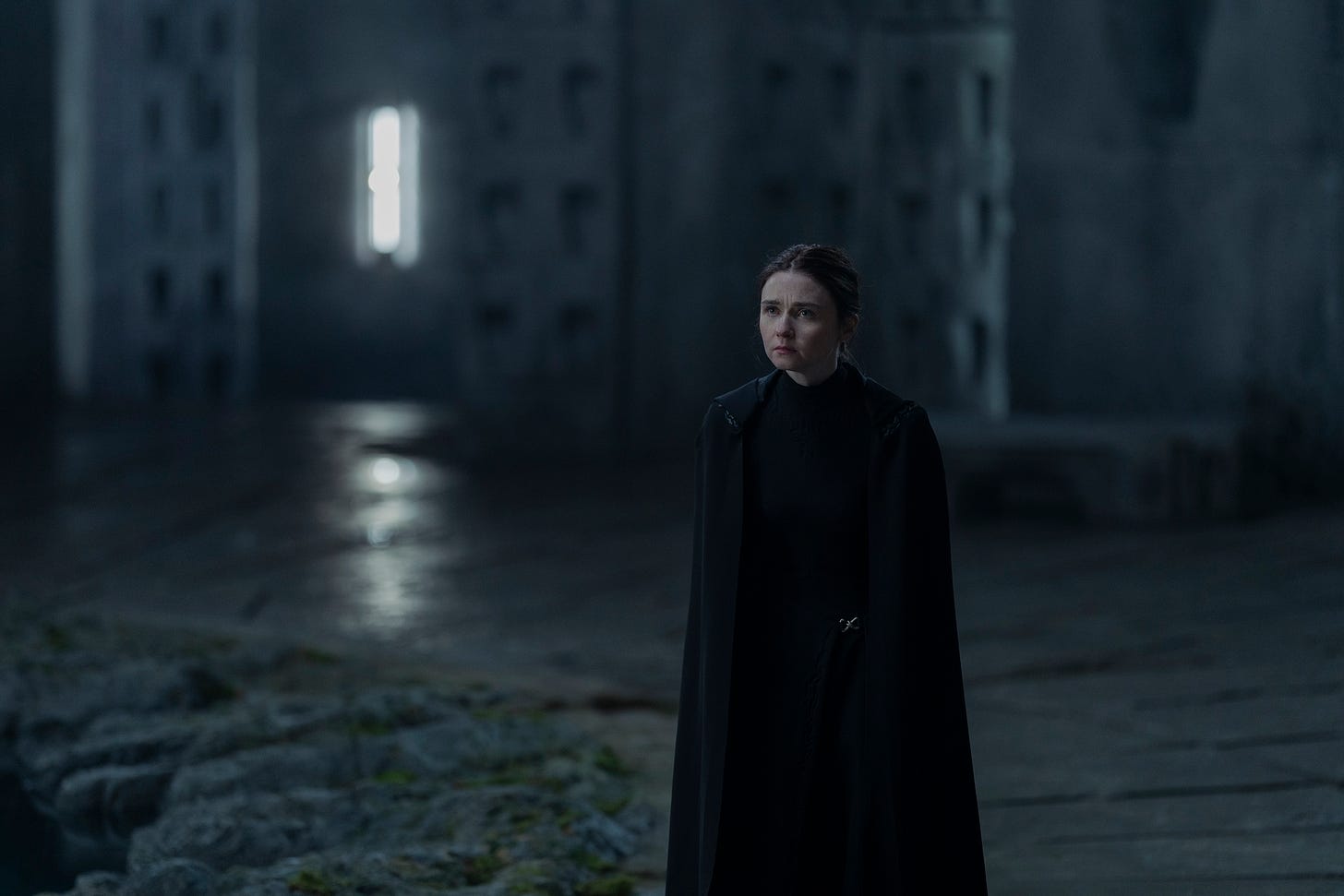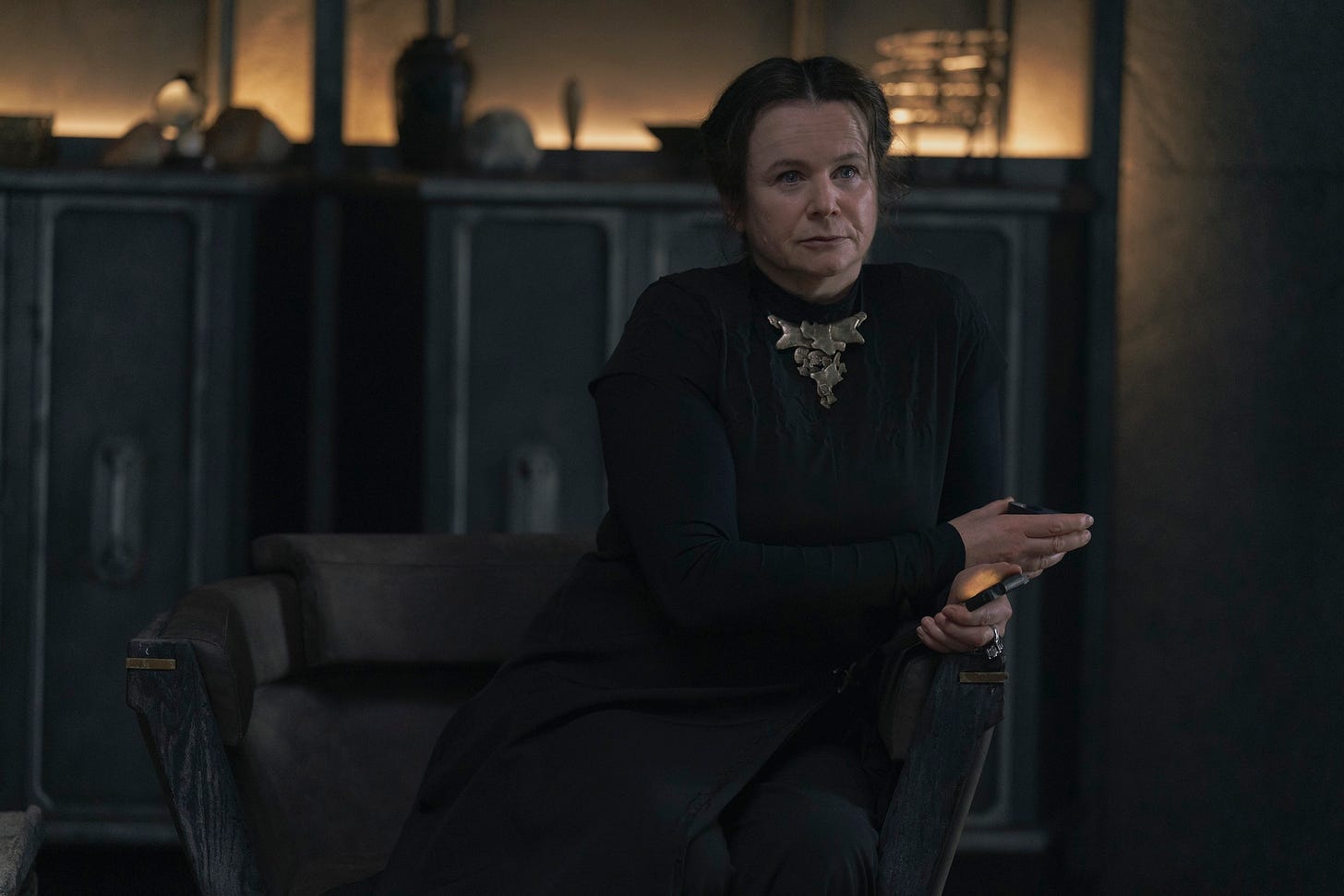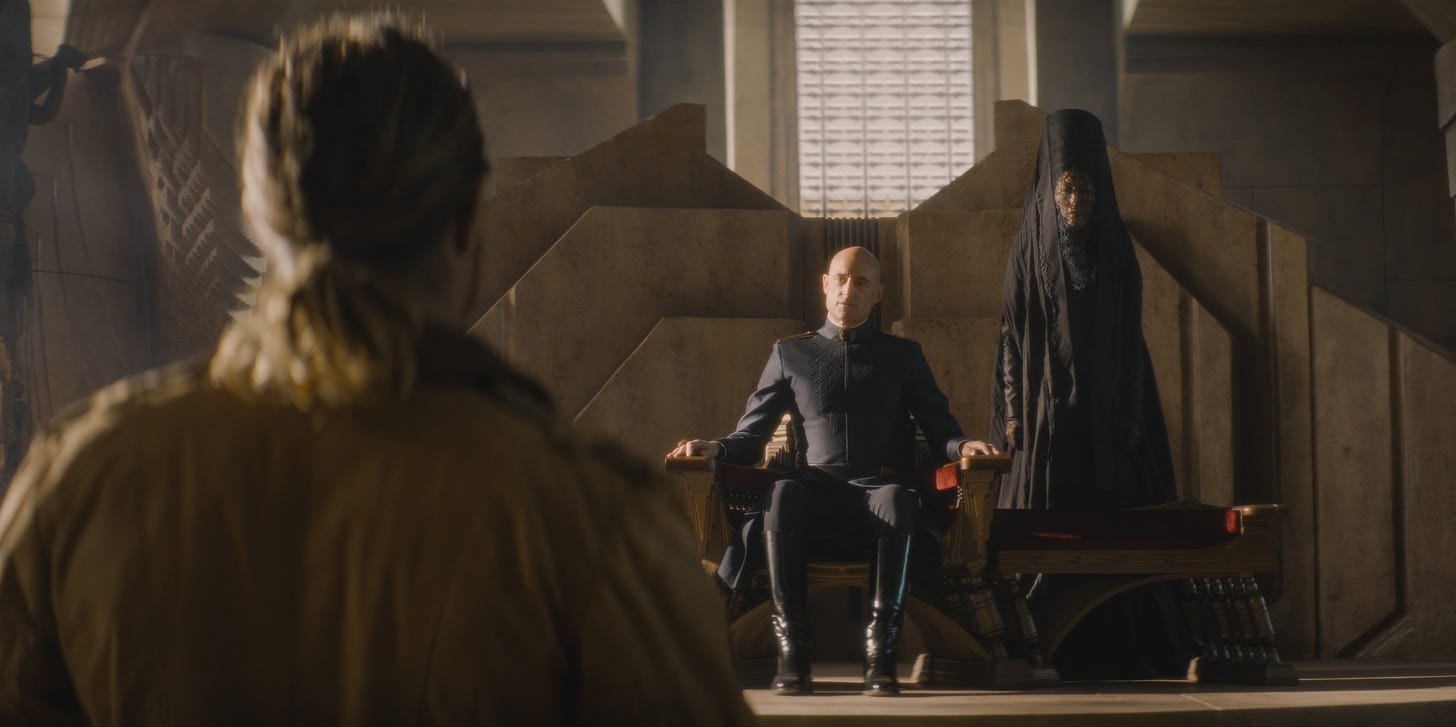Review: Dune: Prophecy, "The Hidden Hand" | Season 1, Episode 1
Sisters and spice and everything you'd expect in a franchise-extending prequel
Welcome to our coverage of Dune: Prophecy, the once-Max-branded prequel to Warner Bros. and Legendary’s Dune feature films, which moved to HBO amid a larger rebranding of original programming from Warner Bros. Discovery. As always, this first review is free, but subsequent reviews will be exclusively for paid subscribers. To learn more about our upcoming schedule, see our About Page.
Denis Villeneuve’s 2021 adaptation of Dune begins with expositional narration, which is par for the course for a science fiction epic. However, it notably comes from the perspective of Chani, Zendaya’s Fremen freedom fighter, who brings the audience up to speed on the Harkonnen occupation of Arrakis. But Chani doesn’t know the whole story: she has no idea why the Harkonnens mysteriously packed up and left, and she can only guess at who their next oppressors might be. It’s worldbuilding exposition, but from a character whose view of the world is fundamentally limited, leaving huge swaths of information—like, for example, the power wielded by the Bene Gesserit—to be discovered as the film progresses.
Dune: Prophecy, HBO’s prequel series, also opens with expositional narration, albeit from a more omniscient perspective, and it’s doing a lot more work in the process. Valya Harkonnen is technically telling us her own origin story: as part of the Sisterhood of Truthsayers that will eventually become the Bene Gesserit, she was chosen by the dying leader to carry on the new—and controversial—mission of genetic manipulation designed to secure the order’s future. But she’s also telling the story of the war with the “thinking machines” that happened decades earlier, details that don’t necessarily seem super pertinent to her story, but are obviously necessary for the larger narrative we’re being introduced to.
Prequels have a distinct relationship with exposition. Developing extensions to major franchises is meant to be a shortcut in terms of driving audience interest: people already have an investment in the story, which makes them that much more likely to tune in (and, ideally, subscribe to do so). However, whereas a spinoff or a sequel are able to sidestep some of the expositional burden that an original series will face, prequels don’t have the same luxury. When Valya’s narration ends, the onscreen chyrons remind us that not only is the show jumping forward thirty years from the time of Valya’s bloody ascension to the position of Mother Superior, but we are a whopping 10,128 years before the birth of Paul Atreides. This might be a familiar world in the sense that spice is a vital resource and the noble houses have names we recognize, but the setup of this story requires a lot of context that the opening prologue rushes through to get to the actual plot of the piece.
As you might be able to tell from the comparison I chose to draw, I don’t think Dune: Prophecy does itself any favors rooting us in the past to start, at least not in an episode that has too much expositional burden to anchor us in any one perspective. Emily Watson’s Valya is no doubt one of the hour’s central characters, and there’s a full circle story for her that is planted in the prologue: her predecessor promised her that she would be the one to “see the burning truth and know,” and sure enough by episode’s end she’s witnessing one of their own spontaneously burning up. But that feels displaced throughout by the sheer volume of palace intrigue that serves as a counterbalance, not to mention the boarding school vibes of the Sisterhood’s trainees, who Valya and her sister Tula (Olivia Williams) oversee. And because the episode feels laborious, the prologue feels like work, rather than an organic extension of Valya’s character.
What Dune: Prophecy lacks in its first episode is a point-of-view that is especially useful for the start of a science fiction epic. This isn’t to say that Valya is a bad point of view, but she knows too much about the state of play, and thus everything we learn tends to be told to us instead of experienced. The episode gets close to an effective POV with Ynez—the princess who the Sisterhood has selected to be their Truthsayer on the throne—but we meet the character after she’s already decided to join their ranks, which makes it harder to feel like we’re following her perspective. Emperor Javvico is less all-knowing than Valya, but he’s still too powerful to be a useful entry into the world, and it doesn’t help that his story is the one that draft mosts heavily on our pre-existing knowledge of the franchise (focused as it is on spice and Arrakis). And while there’s some expositional effort to sketch out the distinctions between the trainees, the fact there’s four makes it hard for any one to stick, and the only reason I came close to learning any of their names was the scene where Valya and Tula go over the Tale of the Tape trying to decide who to partner with the princess upon her arrival.
I want to emphasize that the absence of an ideal POV character doesn’t make this a bad start. From a dramaturgical perspective, this effort to adapt the extended universe of Frank Herbert’s work into a limited series has more or less succeeded at capturing my attention. While we know that the “Truthsayers” are only going to be more powerful 10,000 years later, zooming in on this crucial point in this history where their growing influence is challenged by a spiritual force of unknown origin (the mystically powered Desmond Hart) has a clear resonance to it. The parallel to the “thinking machines” that enslaved humanity is an added bit of social unrest, and points to a desire to explore the function of the Bene Gesserit not just as imperial eugenicists but as a product of a society searching for a new path forward after a seismic shift. “The Hidden Hand” offers a sense of clarity on the path of the story moving forward: Valya faces the very threat she was warned about years earlier, while the Imperium fights smaller battles unaware that the war is happening in the whispers and magicks they don’t understand.
It just hasn’t managed to connect that clarity to any given character arcs that have me especially invested as opposed to interested. The dramaturgical labor of the episode is all on the page, and then on the screen, and the result feels bogged down in a way that Villeneuve’s Dune film avoided. I realize that’s somewhat of an unfair comparison, but it’s impossible not to feel as though the director’s touch is missing here—Anna Foerster has worked on a few TV projects of scale (Westworld, most recently), but even if we account for the absence of traditional “action” compared to the films here, she rarely captures the films’ use of the camera to tell the story. This is understandable, because the actual plot is so much more dense, so there isn’t the same space to develop a new visual language—the result is a show that looks expensive as opposed to impressive, at least to this point. The development hell the prequel series faced robbed us of the potential to see what Villeneuve would have done with this material (or whatever this material was before the various changeovers), and lamenting what was lost is unavoidable.
But again, what made it onscreen works fine, even if the whole thing bears the fingerprints of Warner Bros. asking for the show to become more like Game of Thrones (or more specifically House of the Dragon, if we want to think about prequels). That’s an unavoidable comparison, for a bunch of reasons, but ending the premiere on a small boy being sacrificed in a gnarly fashion is perhaps the most direct parallel. It’s distinct in other ways, like foregrounding its female characters, and it’s not like it’s a bad thing—that was a great setup for a TV show, and Dune: Prophecy has the benefit of not having to spread its story quite so thin. We’re really just jumping between two locations here, and while both have two levels of storytelling, they seem to overlap often enough that we won’t need a map to follow where we’re at. I’m a little perplexed at how some of those elements are going to gel—Ynez’s bad boy half-brother seems particularly CW compared to the other stories, non-derogatory—but the cast is strong enough that I’m willing to see what they want that dynamic to be.
If there is a reason for skepticism, though, it’s the fact that we’re only getting six episodes. Say what you will about Game of Thrones’ pacing, but its early seasons were television seasons, and had an interest in telling stories accordingly. The young trainees story is especially televisual, structurally, but I worry that in a six-episode season there will be little time to explore the relationship between them and consider the younger generation of the Sisterhood. Similarly, if Ynez isn’t just going to seem like a pawn, we need to see her gradually getting her footing, and that’s not really something that six episodes can accomplish when juggling two main story threads like this. And while the lengthy episodes—they all seem to be close to 60 minutes—means there’s going to be enough time to explore each story, there’s a difference between balancing within episodes and across episodes, and the latter would be my concern in this case.
I’ll be curious to see where those concerns land for the community on this one. This is obviously a case where—like Game of Thrones—there’s some with more familiarity with the source material who could connect to the story in distinct ways, and I know that there was an uptick in book readership following Dune’s release back in 2021. However, there’s a difference of degree when it comes to the denseness of Herbert’s novels, and so it feels safe to say that the “experts” audience is smaller in this case. At least from my perspective, my appreciation for the films felt so rooted in their style as opposed to their story that going to the source material never felt urgent, but it will be interesting to see how much of the sensation that this is copy-pasting Thrones and its spinoff will be absent for those who have been exposed to more of Herbert’s worldbuilding.
Right now, as a non-reader, I don’t have a problem with how familiar this feels—it’s just a bit deflating to go through all this work of exposition to end up at a point where it still feels like details of Dune drafted onto other shows. The hope is this clarifies in the weeks ahead, the component parts used to create something that can evolve into its own beast.
Stray observations
I haven’t seen the subsequent episodes—HBO made four available for advance reviews—but I did read some of the coverage, and the most telling detail is that we keep flashing back to Valya’s past. Based on this premiere, I don’t know that I would have presumed this to be true, and I’ll be happy to see more of the uncannily cast Jessica Barden (who I recognize from End of the Fucking World).
Speaking of, the suggestion that Valya was the originator of “the voice” was…maybe a little too convenient, given that she pulls it out without any warning before we understand how she even came upon the idea. Curious if we get more insight into that in the flashbacks.
I realize it’s a matter of perspective, but it’s so weird to have the people who don’t want the Sisterhood to engage in eugenics be described as the “zealots,” right?
I have to say that there’s a lot of exposition in this pilot, but I’ve got questions about the family dynamics here. Kasha talks to Ynez about “the day my sisters and I found you” as “a child held captive for years.” What’s the story there? And they never actually explain her half-brother’s relationship to…anything, as far as I could tell.
Given that Valya basically swears off her family name (and contributes to their ostracization after being labeled cowards in the war, refusing to send them a Truthsayer), I did have questions about what they were up to, so the little bit about them desperately trying to sell whales as a form of trade was appreciated.
And thus begins our coverage of Dune: Prophecy. I’m really interested in hearing how this show resonates, given that (unlike The Penguin) there isn’t a direct connection to the larger franchise. At the very least, this remains the best environment to have a conversation that moves across reader/non-reader lines, so hopefully we’ll see some great dialogue in the weeks ahead.







I am curious on the Director and Casting Director's thought process on having Temu Matt Berry as the leader of House Richese
I'm in a different position than many. I've read six of Herbert's books. I've read Dune the most, and I've seen all movie/television adaptations. The Villenueve films being my favorites.
That said, I haven't read any of his son's books or any on early lore. So much of this 1st episode was totally new to me. I think having a prequel about the origins of the Bene Gesserit is a fantastic idea, but I am quite worried about only having 6 episodes. I'm excited by the casting except for Travis Fimmel who I actively disliked in Raised By Wolves and seems quite similar here.
Unlike others, it never even occurred to me to compare this to Game of Thrones, House of Dragons, or Rings of Power. I find the world of Dune quite distinct from any of those, and I thought the art direction was quite good at making this world its own/recognizable to me. If anything, the closest recent similarity would be The Acolyte (Star Wars series).
I suspect there is much to be discovered and uncovered that was hinted about in this first episode. I have no clue why the burning happened to Kasha, for instance. Or really at all. But I'm okay with my confusion because it's the first episode. I did watch it with subtitles on which was quite helpful. I'm eager for what comes next.